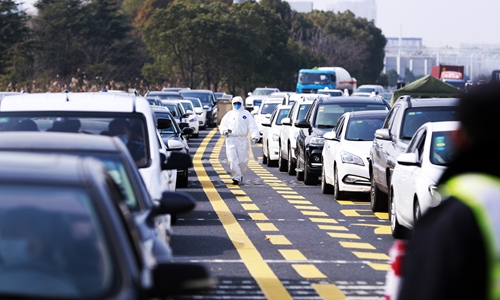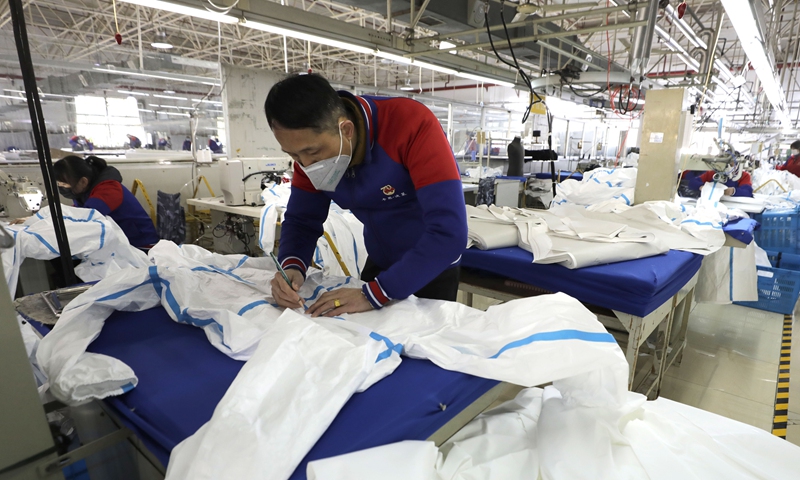HOME >> SOURCE,SPECIAL-COVERAGE
Cities await travel peak amid outbreak
By GT staff reporters Source:Global Times Published: 2020/2/10 1:18:39
Shortage of labor, protective devices hinders restart of production

Vehicles line up for inspection at a public security checkpoint on the Shanghai-Chongqing expressway. The Shanghai government has introduced a range of measures seeking to contain the spread of the virus as people return to the city from their Spring Festival holidays. Under the measures, every vehicle and person must be checked. Photo: cnsphotos
Newly released travel data suggests that work and mass transit will not rebound fully into life on Monday, the date originally set for economic activity to recommence across China and an indication that the novel coronavirus has delayed millions of return trips from the extended Spring Festival holiday.
Chinese observers expressed concerns at the pressure on bigger cities wrought by the traditional travel rush as officials and society itself must try to strike a balance between tackling the virus and resuming production in the world's second-largest economy.
The country's railways delivered 1.27 million passenger trips on Saturday, a plunge of 85.4 percent year-on-year, according to a statement China State Railway Group Co sent to the Global Times on Sunday. The number was estimated to tally 2 million on Sunday, down 82.2 percent.
The figures for railway stations in metropolises including Beijing, Shanghai, Guangzhou and Shenzhen all saw a notable fall on Saturday.
Passenger trips out of Beijing West Railway Station, Beijing's main station and one of Asia's largest, shrank 92.1 percent year-on-year to 8,000 on Saturday, while the number of arrivals fell by 74.9 percent year-on-year to 40,000.
Shanghai Hongqiao Railway Station, registered a decline of 92.7 percent year-on-year to 10,000 for departures and a drop of 63.3 percent to 58,000 for arrivals.
Shanghai Pudong International Airport and Shanghai Hongqiao International Airport are expected to welcome about 75,000 arrivals on Sunday, slightly up on the previous day but considerably down from the year before, according to the Shanghai Observer.
Regions across China previously announced that work and production would restart no earlier than Monday.
The data indicated that economic activity will likely only partially resume on Monday, Chinese observers said, amid work health safety anxieties in bigger cities and especially in the manufacturing and service sectors.
Jack Wang, owner of an auto parts factory in Nantong, East China's Jiangsu Province, told the Global Times that his company cannot resume production Monday as scheduled due to the lack of protective items such as masks. His company supplies a leading German carmaker.
"To restart work, we need to provide masks, disinfectant and thermometers. We got the latter two as well as about 200 masks, but this is still far from enough. I don't think we can pass the government inspection for work resumption," Wang said.
Facing employment and rental costs, Wang said he was pinning his hopes on February 17 to resume work and generate income.
It's impossible to work from home for most of the catering industry and other service sectors, Lu Zhengwei, chief economist at Industrial Bank in Shanghai, told the Global Times on Sunday. This suggested biggest impact of the virus outbreak was not the virus itself, but city and road closures, Lu said.
"The most effective stimulus is not about fiscal or monetary easing, but efforts to contain the virus while resuming work in a fast possible manner," Lu said.
Efforts by medical experts and city management professionals ought be underway to work out feasible plans to restart work in a quick yet safe way and so restore economic activity, Lu asserted.

Photo: Yang Hui
Setting cities in motion
As part of an all-out drive to fight the disease with 813 deaths and 37,287 confirmed infections domestically as of 8pm Sunday, some cities have imposed harsh rules to restrict movement.
Wuxi in East China's Jiangsu Province issued a notice over the weekend that migrant workers from seven provinces with the highest confirmed infections nationwide - Central China's Hubei Province, the epicenter of the virus, East China's Zhejiang, Anhui and Jiangxi provinces, Central China's Henan, Hunan provinces, and South China's Guangdong Province - would all be advised to not return to Wuxi.
Lingering worries appeared to have delayed the return travel rush, Chinese analysts said.
Next week will test city governance as more people return from their hometowns and companies resume work, pressuring officials trying to curb the spread of the new virus.
Of the 10 million people that left Beijing for the Spring Festival holidays, 8 million have not returned, according to Beijing transportation authority data released last week.
"If not managed well, the crowds of mobile people will mean a further rise in the tally of confirmed infections," Tian Yun, vice director of the Beijing Economic Operation Association, told the Global Times on Sunday.
The coronavirus outbreak may peak in the next 10 to 14 days, said Zhong Nanshan, a Chinese respiratory expert and a lead researcher of the novel coronavirus, on February 2.
China's managers of long-distance buses, trains and planes will handle a massive wave of travelers including infected patients who may not always exhibit symptoms.
Resumption of work at labor-intensive industries such as manufacturing presents another challenge.
"How to provide enough protective supplies is of critical importance to ensure operational safety," Tian said. Cities would still "function normally" as companies "serve as pillars to a city's operation," Tian said.
Courier services, medical equipment makers, electricity and water suppliers and supermarkets have basically resumed business, he noted.
"Companies in other industries could sell their stockpiles ahead of the Spring Festival holidays and wait until February 17 to resume production," Tian said.
The delay may incur some losses for private businesses and deal a short term blow to the Chinese economy, he warned. "But our urgent task is to take all means to put the virus under control. Otherwise, the economic losses will be thousands of times more than the current level."
RELATED ARTICLES:
Posted in: ECONOMY,FOCUS